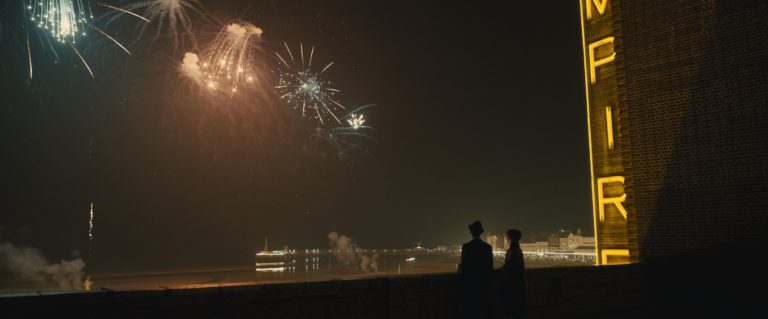Empire of Light (2022 | UK | 113 minutes | Sam Mendes)
“A film born out of lockdown” can imply a lot of things, some of them related to innovation under careful security protocols, but for a filmmaker of a certain station it increasingly means “I was stuck at home with my memories and no editor”. Such is the case with Sam Mendes and Empire of Light — the latest in a series of great auteurs spilling their memories onto the screen with varying degrees of introspection, interrogation, and success. Here, Mendes returns to an idealized theater on the south coast of England into which he has spilled a range of deeply personal issues ranging from precarious mental health, intergenerational romance, the cruel racism of Thatcher’s England in 1980, and, of course, the magic of cinema. It’s … a lot.
Wondrous as ever, Olivia Colman plays the theater’s deeply dedicated duty manager, eking out a solitary existence. She loves the theater — the production design and Roger Deakins’s legendary cinematography make it impossible not to gasp in awe of it’s idealized art deco beauty — but never gets around to seeing the films. Aside from work, a doctor’s check-in references her acclimation to the her medications (lithium, a hell of a drug!) and minor weight gain. The holidays also bring clandestine liaisons with her stuffy boss (Colin Firth, sliding into a familiar role) and dinners shared with a glass of wine and a good book.
Her life cracks open with the hiring of a new ticket taker (Micheal Ward), a fresh-faced recent graduate whose dreams of a career in architecture have been stalled by being passed over by university admissions offices. Black, young, handsome, and interested in the workings of the theater, she feels an immediate spark. A tour of the locked off extra rooms feels like one of those dreams where you discover your apartment has a whole forgotten wing: an entirely parallel world with an old ballroom with expansive views of the sea that’s become home to a flock of pigeons. In terms of subtlety, their first encounter involves a bird whose wing needs mending and a man who knows exactly how to care for the poor confused creature. As their new friendship turns to fling and the pigeon roost to a love nest, there’s an minefield of cliches to navigate and Mendes sets off nearly every one.
The stacked cast and quality of performances is almost enough to stand up to the predictability and cringe of the arcs. Who, after all, doesn’t want to see Olivia Colman working on a broad canvas encompassing delight, dejection, surprise, lust, jealousy, hope and outrage? In the style of so many of these memory pieces, everyone gets a moment or three in the spotlight, a thoughtful speech or word of sage advice, and there are multiple reverent depictions of the art of film projection. But the movie can’t ever quite decide whose story it’s telling. At times, it tries to give equal footing to Micheal Ward’s character, but never quite commits to giving him enough backstory or development to be anything other than an accessory to Colman’s bumpy journey of self-discovery.
Like the theater, Deakins’s exquisite cinematography bathes each interaction in the glassy idealized look of crystalized memory, so even as indulges its own excesses, the film always looks great even as the plot goes off the rails. It’s a movie with multiple monologues about the power of cinema, a light in the darkness, and the community of sharing a good movie with friends and strangers whose protagonist has barely seen a film despite spending most of her waking life in a cinema (oh, the irony). Although the material is clearly so personal to Mendes, one might have wished that a pandemic writing partner would’ve suggested saving some of these memories for the next project.

Armageddon Time (2022 | USA | 115 Minutes | James Gray)
The 1980s were also on the mind of Armageddon Time director James Gray, who takes us back in time to Queens, New York at the dawn of the Me Decade. More directly autobiographical than Empire of Light, the film opens on the first day of sixth grade for his dreamy-eyed, tousled hair, stand-in Paul Graff (a strong, sensitive, and nuanced debut from Banks Repeta) who dreams of being an artist rather than follow his family’s advice to learn something practical or profitable. With his mom, played by a frazzled Anne Hathaway, freshly elected as president of the public school PTA he has the not entirely false belief that his privilege will let him get away with just about any amount of hellraising. Within minutes, he finds camaraderie with a fellow class clown (Jaylin Webb, as astronaut-obsessed Johnny), a self-defeating Black kid repeating the grade and already an adversary of their no-nonsense teacher.
Together, the kids get up to all kinds of trouble, allowing Gray to revisit the gritty New York City of his childhood. Skipping out of Guggenheim field trips in favor of pinball halls, shopping for Sugar Hill Gang albums, and taking dangerously subway rides. He’s equally a terror at home, refusing to eat the newfangled “scrod” his mother cooked for a riotous family dinner, laughing inappropriately at holocaust stories from his aunt, and ordering dumpling delivery in the middle of the meal. His plumber father (Jeremy Strong, incredibly mannered and accented) can only control him through beatings, leaving his grandfather as the only family member with an inside line to the mind of the troubled artiste. Something of a fairy grandfather cast in the gilded frame of loving memory, Anthony Hopkins plays the Lilliputian-Ukrainian Jew with a Welsh accent, at one point commanding his grandson to “be a mensch”. It’s Hopkins at his most twinkly-eyed, so we’ll allow it.
It’s a film about how one insistently delinquent kid can nevertheless make it to a successful career as a film director, and Gray doesn’t steer away from examining his privilege in his reflections on a boisterous year of his childhood. Although his family is decidedly middle-class, Paul is afforded exit ramps like family savings and a spot alongside his older brother at a prestigious private school where alumni like Fred and Mary Trump make boastfully obtuse appearances (and surprising cameo opportunities). Such options might as well be the moon for Johnny, who’s avoiding social services by staying with a grandmother with declining health. The heartbreaking trajectory of Paul and Johnny’s friendship provides a frame for Gray’s interrogation of his advantages. The most admirable part of this often hectic but richly drawn recollection is that the director doesn’t shy away from the squirmy reality that his life is the result of a few unpredictable lucky breaks and the responsibility to make something from them.
Lead image by Parisa Taghizadeh, courtesy of Searchlight Pictures. Empire of Light premiered at the Telluride Film Festival and is scheduled for release by Searchlight Pictures on December 9; Armageddon Time had its North American premiere at the festival and will be released by Searchlight on October 8.




